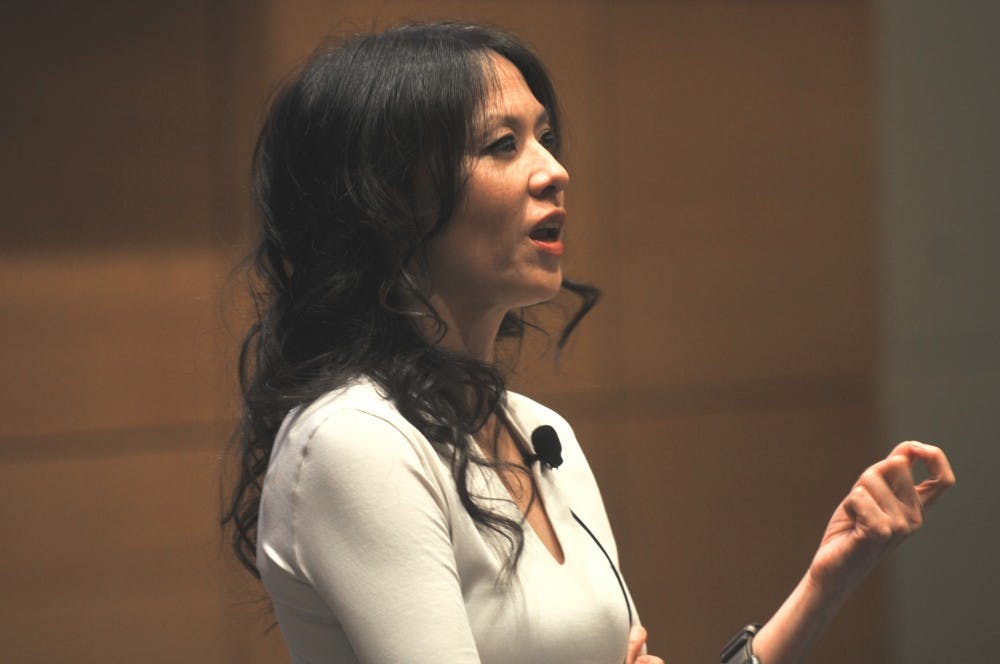
Yale Law professor and self-proclaimed “Tiger Mom” Amy Chua spoke at Penn yesterday as part of the Wharton Leadership Program’s Authors@Wharton series about characteristics that drive some cultural groups to success.
Chua and her husband, Yale Law professor Jed Rubenfeld, introduced their “triple package” theory, an explanation for the disparity in success among cultural groups. Chua and Rubenfeld address their theory in their new book, “The Triple Package: How Three Unlikely Traits Explain the Rise and Fall of Cultural Groups in America.”
“It’s just a fact about America today — an uncomfortable fact — that some ethnic and religious groups are doing much better than the rest of the country,” Rubenfeld said. “I’m talking in terms of income and professional and educational attainment.”
The husband-wife duo explained that Jews, Indians, Persians, Lebanese, Chinese, Cubans, Nigerians and Mormons, among other groups in America, tend to achieve greater success than others. They spent several years trying to understand what these handful of cultural groups had in common. In the end, they determined that each group they studied had not one, but a mixture of three characteristics in common: “the triple package.”
The first two traits include a superiority complex, a collective feeling of exceptionality over other cultural groups, and insecurity, the feeling of needing to prove oneself to others. While these two elements may seem contradictory, Chua argues that cultural groups require the unique balance of these two characteristics to succeed.
“It’s weird to think of somebody simultaneously feeling insecure and superior,” Chua said. “And yet, it’s that unlikely, almost unstable combination that generates drive, this kind of hunger to be respected, this need to prove yourself and show everyone, almost like a chip-on-your-shoulder mentality.”
To explain this apparent contradiction, Chua and Rubenfeld point to American Mormons as an example. Mormons are a group that has long been persecuted and marginalized in the United States, creating a collective feeling of insecurity. Yet, at the same time, followers of the religion, like followers of Judaism, believe that they are “the chosen ones.” Chua and Rubenfeld claim that this combination of feeling insecure and exceptional can in part explain how a group that makes up 1.7 percent of the population includes prominent leaders like Mitt Romney, Senate Majority Leader Harry Reid and the CEOs of many major corporations.
The third element of the triple package is impulse control, the ability to delay gratitude in order to work toward achieving greater success. In practice, this amounts to a stricter style of parenting, something Chua is widely known for, due to her heavily debated book, “Battle Hymn of the Tiger Mother.”
“Instead of viewing childhood as a time to be carefree and have fun, parents in triple-package cultures, view childhood more as a kind of training period, a time to prepare for the future,” Chua said. “All of the groups we looked at, in very different ways, tend to impose much stricter practices of self-discipline, hard word and focus in their children and at a much earlier age.”
Chua and Rubenfeld both stressed that as these three elements come and go in each culture, as do the collective success of each group. Additionally, they believe that the triple package can be learned by any individual — something that could have even stronger implications for understanding inequality in America.
“If we could figure out how these working class kids are experiencing so much upward mobility when the rest of the country isn’t, we’d be in a position to transform this nation’s approach to inequality and poverty,” Rubenfeld said.
The Daily Pennsylvanian is an independent, student-run newspaper. Please consider making a donation to support the coverage that shapes the University. Your generosity ensures a future of strong journalism at Penn.
DonatePlease note All comments are eligible for publication in The Daily Pennsylvanian.




